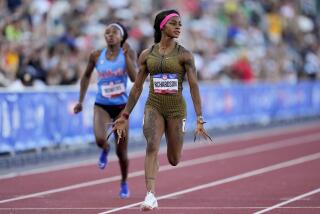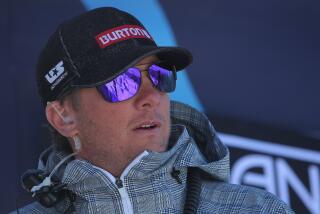USA Track and Field Breaks Silence on Young
- Share via
In a step that may prove pivotal for U.S. Olympic gold won at the 2000 Sydney Games, USA Track & Field admitted Sunday that U.S. sprinter Jerome Young had tested positive for a banned steroid in 1999 but had been cleared by a USATF panel to compete in Sydney.
After tenaciously guarding Young’s identity since a positive test in June 1999 for the steroid nandrolone, USATF for the first time said it would turn over key documents naming him as the athlete whose case has for years strained U.S. relations with the International Olympic Committee and additional sports authorities.
In a letter sent Sunday from USATF President Bill Roe to U.S. Olympic Committee acting President Bill Martin, USATF also said it “sincerely regrets and apologizes for the difficulties” the case has caused. USATF’s adherence to confidentiality rules to the seeming exclusion of all other interests “created suspicion” of a cover-up, the letter said, acknowledging in turn that “may have caused harm to the public’s perception of the Olympic movement, which we deeply regret.”
The move puts at stake the gold medals won in Sydney by Young and five others, including Michael Johnson, who ran in the preliminaries or final round of the 1,600-meter relay. In modern Olympic history, only two Americans have received medals and have been forced to return them: Jim Thorpe, who won gold in the decathlon at Stockholm in 1912, and swimmer Rick DeMont, who won gold at Munich in 1972.
The IOC has launched a “disciplinary” commission; the matter is on the agenda for the IOC’s next meeting, in late February in Athens. Track’s worldwide governing body, the International Assn. of Athletics Federations, intends to mount a formal legal challenge at the Swiss-based Court of Arbitration for Sport.
The 2004 Olympics begin in Athens on Aug. 13. IAAF spokesman Nick Davies said Sunday upon learning of the USATF letter, “The Jerome Young affair has been festering for too long and the sooner we end it the better.”
IOC spokeswoman Giselle Davies said the IOC too “welcomes this development, which takes the issue one step further down the road to being resolved.”
Young could not be reached Sunday to comment. He has said he never “committed a doping offense.”
A positive doping test marks the first step in a series of scientific, administrative and sometimes legal proceedings. The end result is either the finding of a “doping offense,” which typically leads to a suspension, or a clearance to compete. A nandrolone offense typically means a two-year suspension; such a suspension would have kept Young out of the Sydney Games.
Young, now 27, of Fort Worth, the world’s current 400-meter champion, tested positive on June 26, 1999, at the USATF national championships at Stanford.
A USATF hearing board found against Young. However, a USATF appeal board, acting in July 2000, just days before the Olympic trials, cleared him to compete.
The hearing and appeal were conducted in secret, depriving the IAAF of a chance to review the case.
In Sydney, it was well known that a U.S. athlete had tested positive the year before for something but been cleared to compete. But despite repeated requests, in particular from the IAAF, USATF declined to open its files, citing confidentiality concerns and the risk of what it Sunday called “substantial, uninsured liability.”
The case -- which came to be known as that of the “unnamed athlete from Sydney” -- fueled a perception that USATF has, to the benefit of American athletes and the U.S. Olympic team, concealed information about U.S. athletes testing positive. USATF officials insist that perception is misplaced.
The Times on Aug. 27 identified the athlete as Young. The USOC in September confirmed to the IOC that it was Young.
USATF came forward Sunday only after the USOC last week had issued an ultimatum that USATF produce its files by Feb. 24. USOC spokesman Darryl Seibel said USATF’s action “represents the type of cooperation and compliance we’ve been seeking for months.”
If USATF had failed to produce its records by Feb. 24, Martin said, he planned to initiate USOC proceedings to decertify USATF as the nation’s governing body for track and field.
The USOC on Dec. 19 imposed sanctions on USATF, including the suspension of about $3 million that flows annually from the USOC to USATF.
Martin said last week that sanctions would remain in effect until the “matter is resolved.”
More to Read
Go beyond the scoreboard
Get the latest on L.A.'s teams in the daily Sports Report newsletter.
You may occasionally receive promotional content from the Los Angeles Times.






